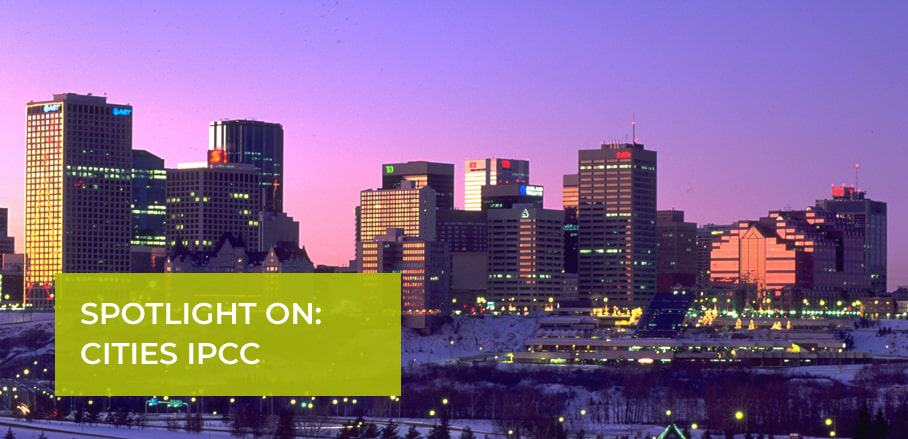Creating a low-carbon and equitable future: Cities IPCC sets blueprint for urban transformation
By Stephen Leahy
This week, a wealth of ideas and concepts were generated by an astonishingly diverse group that included climate scientists, city planners and high school students at the CitiesIPCC—Cities and Climate Change Science Conference in Edmonton, Alberta. The conference concluded with agreement that cities must urgently transform into low-carbon, equitable communities and mapped out a research agenda on how to get there.
“For the last three days Edmonton was at the centre of the future of the world,” said Debra Roberts of Durban, South Africa, the IPCC Working Group 2 Co-chair. The barriers between disciplines and worldviews were broken and science is being brought to the level where real people live, showing how science can partner with policy and practice, said Roberts. “This is the message we will carry out into the world.”
[inlinetweet prefix=”” tweeter=”urbanet_info” suffix=””]The main outcome of the IPCC conference was a collective effort by the science, policy and practice communities to co-create and co-design a global research agenda on cities and climate change.[/inlinetweet] Equally important, it gave recognition and visibility to the knowledge generated by a wide-range of urban actors.
Youth needs to be taught how to reduce their emissions or how to adapt to climate change
A key part of this research agenda is to strengthen the social sciences to better understand complex questions like the role of informal settlements in addressing climate change, said Anne-Hélène Prieur-Richard, Global Hub Director, Montreal, of Future Earth. “We can only create real transformative changes in cities through research focusing on issues of equity, power distribution, integration of values, and human behaviour,” she said.
A lack of awareness is the biggest barrier to addressing climate change according to a survey of over 4,000 high school students from 13 countries. Many of these students worked together for several weeks in a Virtual Town Hall to discuss the vision of youth on education, cities and climate change. A small group of students presented their findings in Edmonton saying climate change is the most critical problem facing youth of the world. However, youth is not being taught how to reduce their emissions or how to adapt to climate change. IPCC officials asked youth if they would help translate their next reports into action in their respective schools.
It has taken over 10 years for cities to be part of the UN climate process and now the IPCC, said David Miller, North America Regional Director for C40 Cities and former mayor of Toronto. “Cities need science to meet our urban challenges, to know what the regional impacts of climate change will be and how to build resilience,” Miller said. There is also a special need for more social science to help make the needed transformational changes. “City residents want action on climate. Edmonton’s ambitious climate plan was passed unanimously which is something since the regional economy is based on the oil and gas industry.”
Reaching for the climate target “is making a better place to live and work in”
The City of Oslo has about 40 different climate action measures underway to reach its ambitious goal of 36 percent less carbon emissions than its 1990 baseline by 2020 and 95 percent reduction by 2030. The overarching action measure is the world’s first climate budget.
Each year Oslo sets a carbon reduction target and asks all city departments to count up their carbon emissions and come up with ways they can make cuts and contribute to reaching the target. Just as departments can’t spend more money than is in their budget, they can’t emit more carbon than their budgets. The finance department is in charge and monitors progress much like a financial budget.
Since new cuts have to be made every year, a large range of measures are needed including the elimination of oil heating in buildings by 2020, phase out of fossil fuel cars by 2030, increasing cycling so that 25 percent of daily journeys are on bikes and more. Oslo also has several pilot projects that include fossil-free construction sites for new buildings.
“Residents understand this is making Oslo a better place to live and work in,” said Andreas Tveteraas, Office for Climate, Department of Environment and Transport, City of Oslo. Oslo’s climate target does not include its consumption emissions; the goods and services that it obtains outside of the city limits. Tveteraas acknowledged that this next step will be even more difficult.
World’s biggest cities have a carbon footprint that is 60 percent larger than estimated
On the second day of the conference a new report revealed that [inlinetweet prefix=”” tweeter=”urbanet_info” suffix=””]many of the world’s biggest cities have a carbon footprint that is 60 percent larger than previously estimated[/inlinetweet] when all the products and services a city consumes are included. The report estimated the carbon emissions for food, clothing, electronics, air travel, construction materials, and so on consumed by residents but produced outside city limits.
“We are missing the other side of the coin if we only measure emissions involved in the production of food, energy, or other products and services,” said report author Michael Doust, programme director at C40 Cities. “Knowing what the consumption emissions are and where, allows cities and residents to make better decisions on how to reduce their carbon emissions.”
Ever greater consumption of goods is the basis of the current economic system and it simply cannot continue said William Rees, an ecological economist at the University of British Columbia. Rees said much of the discussion at the conference was more about reform and not the real transformation that is needed, which necessarily includes the transformation of institutions, politics, economics and cultural values.
[inlinetweet prefix=”” tweeter=”urbanet_info” suffix=””]Scientist Debra Roberts agreed that the big fight ahead is to displace the current global economic system based on consumption. “We need strong networks of cities to achieve this.”[/inlinetweet]
